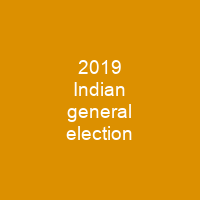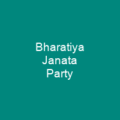The 2019 Indian general election was held in seven phases from 11 April to 19 May 2019 to constitute the 17th Lok Sabha. About 911 million people were eligible to vote, and voter turnout was over 67 per cent. The Bharatiya Janata Party won 303 seats, further increasing its substantial majority. The BJP-led National Democratic Alliance won 353 seats. The Indian National Congress won just 52 seats.
About 2019 Indian general election in brief

Some people convicted of electoral or other offences are barred from voting. The elections are held on schedule and as per the Constitution of India that mandates parliamentary elections once every five years. The election schedule was announced on 10 March 2019, and with it the Model Code of Conduct came into effect. The BJP won 37. 36% of votes, while the NDA’s combined vote was 45% of the 60. 37 crore votes that were polled. The polling for the Anantnag constituency in the state of Jammu and Kashmir washeld in three phases, due to violence in the region. The President of India appoints an additional two members from the Anglo-Indian community if he believes that community is under-represented. The major economic achievements of the incumbent NDA government include an inflation rate less than 4 per cent and the GST reform, the Insolvency and Bankruptcy Code. The Jan Dhan Yojana, rural cooking gas and electricity for homes, have positively touched many among the Indian masses, include the Jan Dhani scheme. The ECI accused the Congress party, along with other opposition parties and a group of retired civil servants, of being compromised, and implied that they endorse the model code of conduct violations by Narendra Modi and other BJP political leaders during their campaigns. The group states that such political attacks on theECI are a ‘deliberate attempt to denigrate and delegitimise the democratic institutions’
You want to know more about 2019 Indian general election?
This page is based on the article 2019 Indian general election published in Wikipedia (as of Dec. 06, 2020) and was automatically summarized using artificial intelligence.







